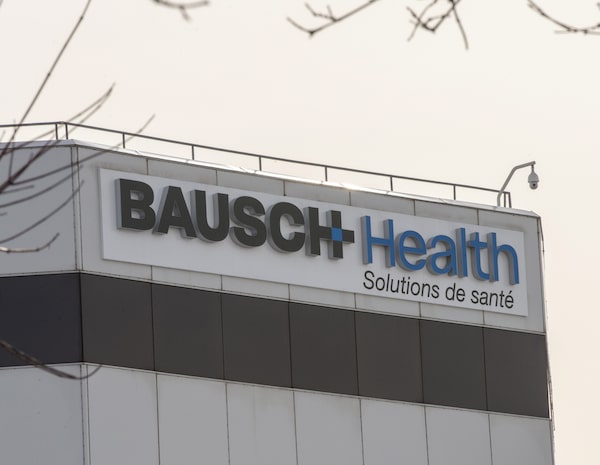
Laval, Que.-based Bausch, which was previously known as Valeant Pharmaceuticals International Inc. and was at one time the largest Canadian company by market capitalization, said on Monday it has agreed to the settlement, which still requires approval from a New Jersey court.Ryan Remiorz/The Canadian Press
Bausch Health Companies Inc. is taking another step to distance itself from the toxic past of its Valeant era, announcing a US$1.21-billion settlement in a class action lawsuit.
Laval, Que.-based Bausch, which was previously known as Valeant Pharmaceuticals International Inc. and was at one time the largest Canadian company by market capitalization, said on Monday it has agreed to the settlement, which still requires approval from a New Jersey court.
U.S. securities holders originally filed the class action in 2015 over the dramatic decline in Valeant’s share price after a slew of allegations of misconduct, including claims that it failed to provide accurate and material information about its relationship with Philidor Rx Services LLC, a mail-order pharmacy.
In a subsequent court filing in the case, the plaintiffs said Valeant suffered a market capitalization decline of nearly US$80-billion as its stock price fell from a high of more than US$262 a share to less than US$25 in June, 2016.
“Resolving this action enables Bausch Health to close the door on one of the more meaningful and unpredictable liabilities associated with the legacy Valeant era,” chief executive Joseph Papa said in a statement. “The settlement of this case removes a cloud of uncertainty and ensures that current and future stakeholders will enjoy the benefits of the ongoing transformation of Bausch Health.”
Bausch Health has admitted no liability and continues to deny allegations of wrongdoing related to the U.S. class action. The company, which is listed on both the Toronto and New York stock exchanges, still faces a similar class action lawsuit involving Canadian securities holders.
Under previous CEO Michael Pearson, the pharmaceutical maker was known for an aggressive string of acquisitions, price hikes on drugs and a surge in its market capitalization. That rise was halted when short sellers attacked the company over its ties to Philidor, which later shut down. Valeant also faced intense political scrutiny over its pricing practices and was a high-profile target of a U.S. Senate hearing on drug pricing. And in 2018, a former Valeant executive and the former Philidor CEO were both convicted of fraud and sentenced to prison time.
Seeking to rebuild its tattered reputation, in 2016 Valeant restated financial results for the previous two years, pointing to errors in when it accounted for revenue related to drug sales through Philidor. It also slashed its outlook for the year and later replaced Mr. Pearson with new CEO Mr. Papa.
In 2018, Valeant rebranded itself as Bausch Health, taking part of the name of its well respected eye care subsidiary Bausch + Lomb.
Valeant still faces numerous securities lawsuits, but Monday’s settlement drew some praise from credit rating agency S&P Global Ratings, which upgraded its rating on the company to B-plus from a previous rating of B.
“While the settlement amount is significant, it removes an uncertainty and further demonstrates current management’s ability to resolve legacy management and governance issues,” S&P said in a statement. “In the meantime, the company has steadily reduced debt, has returned to revenue growth, and is projected to generate annual free cash flows of over $1-billion.”
Fellow ratings agency Fitch did not adjust its ratings on the company noting that while the settlement “reduces the uncertainty of contingent liability risk, it also significantly reduces the company’s flexibility with respect to debt leverage.”
Bausch Health said in the statement it will cover the settlement using a combination of sources that could include cash, a revolving credit facility and potentially tapping capital markets. It said the settlement will not affect its 2019 financial guidance.
The company said it expects the settlement to be made public later this week and offered no further comment on Monday.
Your time is valuable. Have the Top Business Headlines newsletter conveniently delivered to your inbox in the morning or evening. Sign up today.